WES MONTGOMERY / Wes Montgomery Mixtape
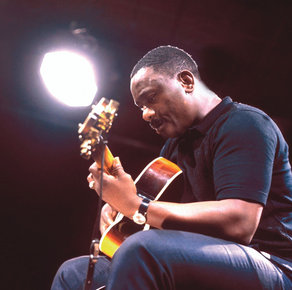 Guitars have never been a major lead instrument in jazz—pianos yes, guitars no. Maybe this phenomenon has something to do with pianos being the major instrument in classical music and guitars not happening so much in English, German, and French music, especially their classical traditions. Plus, we in the United States not only were heavily influenced by the English, but the "Latin" use of the guitar never arrived here with much force. I recall a Brazilian musician commenting that most of his music was composed on guitar whereas most of the North American music was composed at the piano.
In any case, there is one very important exception to that trend: Black music. Obviously the blues was a guitar-based music, but also West Africans had a strong tradition of string instruments. A second factor is probably economics—poor people could not afford pianos but could fashion guitars of sorts from boxes, or in the case of the didley-bow from the side of a house. Obviously, this whole "guitar" as less prevalent than the piano discussion except in black music could go on and on, and on. Right now, however, I want to focus on one of the most astonishing guitarists in jazz history: Wes Montgomery.
Guitars have never been a major lead instrument in jazz—pianos yes, guitars no. Maybe this phenomenon has something to do with pianos being the major instrument in classical music and guitars not happening so much in English, German, and French music, especially their classical traditions. Plus, we in the United States not only were heavily influenced by the English, but the "Latin" use of the guitar never arrived here with much force. I recall a Brazilian musician commenting that most of his music was composed on guitar whereas most of the North American music was composed at the piano.
In any case, there is one very important exception to that trend: Black music. Obviously the blues was a guitar-based music, but also West Africans had a strong tradition of string instruments. A second factor is probably economics—poor people could not afford pianos but could fashion guitars of sorts from boxes, or in the case of the didley-bow from the side of a house. Obviously, this whole "guitar" as less prevalent than the piano discussion except in black music could go on and on, and on. Right now, however, I want to focus on one of the most astonishing guitarists in jazz history: Wes Montgomery.
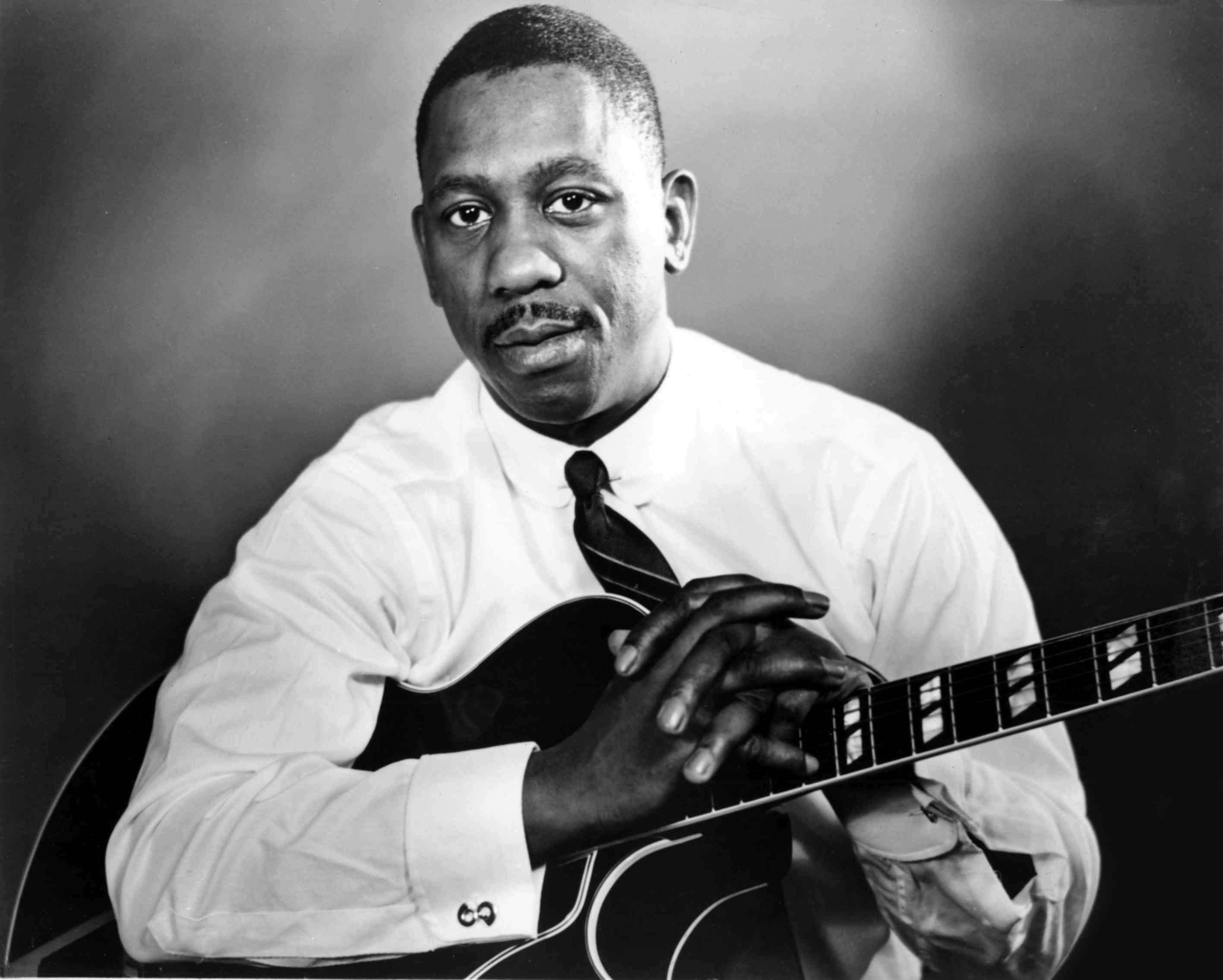 Some argue his uniqueness and prowess was because he was self-taught and mostly learned to play by ear, which meant he had not been saddled with rules and examples of what and what not to do, what was and wasn't possible on his instrument. In that regard one of the stories is that he developed his "thumb" technique because he would practice at night after work and did not want to disturb his wife.
In the liner notes to The Ultimate Wes Montgomery, highly respected, popular guitarist/vocalist George Benson asserts that there will never be another guitarist like Wes just on technique alone. According to Benson, Wes had developed a callous on his thumb that enabled him to use the fleshy part of his thumb for one sound and the calloused part for a harder sound, sometimes almost simultaneously. Plus, others have noted that Wes had a double-jointed thumb that gave him unmatched flexibility for strumming and chording. But more than accidents of birth and idiosyncrasies, Wes also had a whippet quick harmonic imagination matched by awesome technical facility.
When you hear some of the astounding runs and chording that Wes did in a jazz solo, Coltrane's interest becomes entirely understandable. Many people might think of Coltrane and Wes as an odd coupling but they were both masters of harmony and improvising at fast tempos on the one hand, as well as expert ballad players on the slow hand side. Just as Coltrane's improvisations on the saxophone seemed other worldly, Wes had a similar masterful command of the guitar. The biggest difference was the direction they chose to pursue.
Coltrane remained an experimentalist until his death. Montgomery chose to explore popular music. Comparing their late period outputs one might not hear any convergence but the influence each had as an instrumentalist was dominant for their instruments. Moreover, check that Coltrane's composition "Impressions" was recorded by Montgomery multiple times.
Some argue his uniqueness and prowess was because he was self-taught and mostly learned to play by ear, which meant he had not been saddled with rules and examples of what and what not to do, what was and wasn't possible on his instrument. In that regard one of the stories is that he developed his "thumb" technique because he would practice at night after work and did not want to disturb his wife.
In the liner notes to The Ultimate Wes Montgomery, highly respected, popular guitarist/vocalist George Benson asserts that there will never be another guitarist like Wes just on technique alone. According to Benson, Wes had developed a callous on his thumb that enabled him to use the fleshy part of his thumb for one sound and the calloused part for a harder sound, sometimes almost simultaneously. Plus, others have noted that Wes had a double-jointed thumb that gave him unmatched flexibility for strumming and chording. But more than accidents of birth and idiosyncrasies, Wes also had a whippet quick harmonic imagination matched by awesome technical facility.
When you hear some of the astounding runs and chording that Wes did in a jazz solo, Coltrane's interest becomes entirely understandable. Many people might think of Coltrane and Wes as an odd coupling but they were both masters of harmony and improvising at fast tempos on the one hand, as well as expert ballad players on the slow hand side. Just as Coltrane's improvisations on the saxophone seemed other worldly, Wes had a similar masterful command of the guitar. The biggest difference was the direction they chose to pursue.
Coltrane remained an experimentalist until his death. Montgomery chose to explore popular music. Comparing their late period outputs one might not hear any convergence but the influence each had as an instrumentalist was dominant for their instruments. Moreover, check that Coltrane's composition "Impressions" was recorded by Montgomery multiple times.
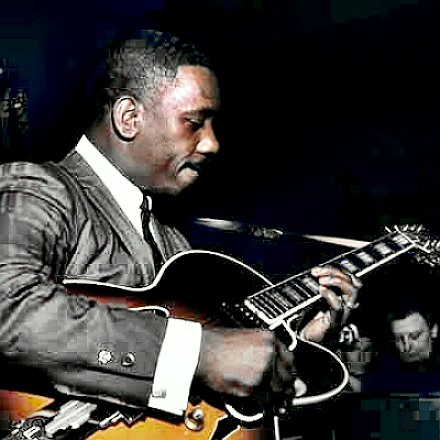 The Mixtape is divided into straight ahead, combo jazz recordings for the first part and popular-oriented selections in the second part. With the exception of the first track "Snowfall" (recorded with Wes' brothers, Buddy and Monk Montgomery) and the sixth selection " 'Round Midnight" (recorded with famous organist Jimmy Smith) all of the straight ahead tracks are taken from the Wynton Kelly and Wes Montgomery recording that many critics consider Wes' ultimate jazz recording.
I am not a purist when it comes to Wes Montgomery. I think much of the work he did in the popular vein is not only masterful, his playing is also unmatched by many others who tried to fill Wes' shoes when Wes died of a massive heart attack on June 15, 1968 at the relatively young age of 45. Coltrane had been only 40 when he died on July 17, 1967, a year and a month before Montgomery. I am linking Montgomery and Coltrane precisely because I believe they had a comparable impact on their chosen instruments.
While it is easy to assert that Wes sold out and did not make quality jazz in the second half of his short career, I think that's an elitist view. While it is true that Wes was not playing straight ahead jazz during the Verve and A&M years, that doesn't mean there was no substance to Wes' work. The truth is Wes Montgomery had no peer as a popular guitarist.
Although many tried, no one else was able to make a guitar sing (and weep) like Wes Montgomery whether playing single notes, chords or octaves. Certainly no other guitarist was able to combine all three techniques in one solo the way Wes Montgomery could. Moreover, Wes was not just a cold technician, he also played with emotional warmth. On the straight ahead sides Wes was generally accompanied by wonderful professional jazz musicians and Wes' popular music was arranged by masters of their trade. I've included a healthy selection of songs that feature the big band arrangements of Oliver Nelson, another heavy jazz musician who ended up pursuing popular music.
Regardless of which Wes you prefer, the other Wes has a lot to offer. Give a listen to the whole Mixtape and see if you don't agree that Wes Montgomery was an astonishing guitarist.
—Kalamu ya Salaam
Wes Montgomery Mixtape Playlist
The Mixtape is divided into straight ahead, combo jazz recordings for the first part and popular-oriented selections in the second part. With the exception of the first track "Snowfall" (recorded with Wes' brothers, Buddy and Monk Montgomery) and the sixth selection " 'Round Midnight" (recorded with famous organist Jimmy Smith) all of the straight ahead tracks are taken from the Wynton Kelly and Wes Montgomery recording that many critics consider Wes' ultimate jazz recording.
I am not a purist when it comes to Wes Montgomery. I think much of the work he did in the popular vein is not only masterful, his playing is also unmatched by many others who tried to fill Wes' shoes when Wes died of a massive heart attack on June 15, 1968 at the relatively young age of 45. Coltrane had been only 40 when he died on July 17, 1967, a year and a month before Montgomery. I am linking Montgomery and Coltrane precisely because I believe they had a comparable impact on their chosen instruments.
While it is easy to assert that Wes sold out and did not make quality jazz in the second half of his short career, I think that's an elitist view. While it is true that Wes was not playing straight ahead jazz during the Verve and A&M years, that doesn't mean there was no substance to Wes' work. The truth is Wes Montgomery had no peer as a popular guitarist.
Although many tried, no one else was able to make a guitar sing (and weep) like Wes Montgomery whether playing single notes, chords or octaves. Certainly no other guitarist was able to combine all three techniques in one solo the way Wes Montgomery could. Moreover, Wes was not just a cold technician, he also played with emotional warmth. On the straight ahead sides Wes was generally accompanied by wonderful professional jazz musicians and Wes' popular music was arranged by masters of their trade. I've included a healthy selection of songs that feature the big band arrangements of Oliver Nelson, another heavy jazz musician who ended up pursuing popular music.
Regardless of which Wes you prefer, the other Wes has a lot to offer. Give a listen to the whole Mixtape and see if you don't agree that Wes Montgomery was an astonishing guitarist.
—Kalamu ya Salaam
Wes Montgomery Mixtape Playlist
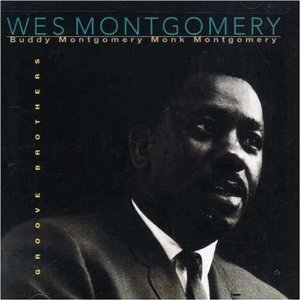 01 "Snowfall" - Grove Brothers
01 "Snowfall" - Grove Brothers
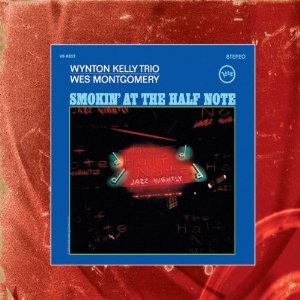 Smokin' At The Half Note
02 "Unit 7"
03 "If You Could See Me Now"
04 "What's New?"
05 "Impressions"
Smokin' At The Half Note
02 "Unit 7"
03 "If You Could See Me Now"
04 "What's New?"
05 "Impressions"
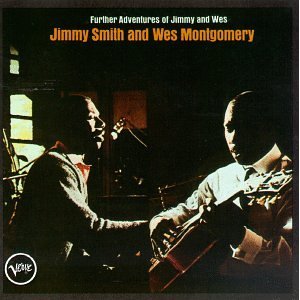 06 " 'Round Midnight" - Further Adventures of Jimmy and Wes
06 " 'Round Midnight" - Further Adventures of Jimmy and Wes
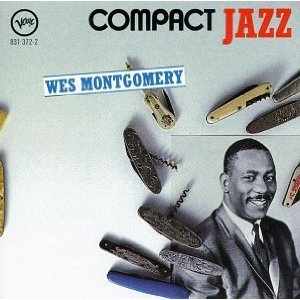 Compact Jazz
07 "Bumpin' On Sunset"
08 "California Dreaming"
09 "The Shadow Of Your Smile"
10 "Tequila"
11 "Once I Loved"
12 "Here's That Rainy Day"
13 "Goin' Out of My Head"
Compact Jazz
07 "Bumpin' On Sunset"
08 "California Dreaming"
09 "The Shadow Of Your Smile"
10 "Tequila"
11 "Once I Loved"
12 "Here's That Rainy Day"
13 "Goin' Out of My Head"
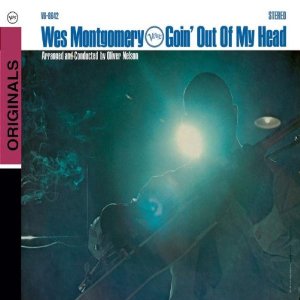 Goin' Out Of My Head
14 "O Morro"
15 "End of a Love Affair"
16 "It Was a Very Good Year"
17 "Golden Earrings"
Goin' Out Of My Head
14 "O Morro"
15 "End of a Love Affair"
16 "It Was a Very Good Year"
17 "Golden Earrings"
This entry was posted on Monday, February 13th, 2012 at 12:07 am and is filed under Classic. You can follow any responses to this entry through the RSS 2.0 feed. You can leave a response, or trackback from your own site.
3 Responses to “WES MONTGOMERY / Wes Montgomery Mixtape”
February 13th, 2012 at 10:46 am
And oh, I didn’t take the opportunity to comment on the Sander’s perspective. It was fabulous. Like the editor of this welcomed site, I’ve had several opportunities to see the master in person. The first was 1970/71, my freshman year at Amherst College and Pharoah was performing at The Academy in Northampton. These southern ears, use to hearing only the Duke Ellington styled big bands and of course the plethora of popular music had his mind completely blown. His solos sent a few running but I remained, feeling something was happening which was quite foreign but would make itself clear, if not then, some time in the future. And yes, they day arrived and I am so glad to have stayed. Amen.
February 16th, 2012 at 3:00 pm
Kalamu ya Salaam,
Thank you for letting me discover so many good musicians with your site. I also loved Wes Montgomery with his wonderful and subtil sound guitar.
As a Bossa Nova lover his sound guitar kill’s as Joao Gilberto can. It should be on my next buying list. For now your editorials choices are incrising a lot my CD library
Let me introduce to you, if you don’t know, a new brasilian women singer, Rosalia de Souza. I only have her d’Improviso record and it’s joycfull.
A-men, from an atheist and people lover. Thank’s Kalamu ya Salaam,
François Cartan
Leave a Reply
| top |